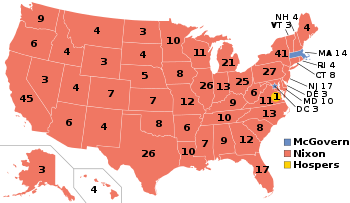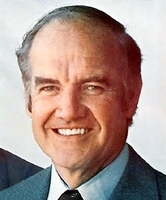1972 United States presidential election
| |||||||||||||||||||||||||||||
538 members of the Electoral College 270 electoral votes needed to win | |||||||||||||||||||||||||||||
|---|---|---|---|---|---|---|---|---|---|---|---|---|---|---|---|---|---|---|---|---|---|---|---|---|---|---|---|---|---|
| Turnout | 55.2%[1] | ||||||||||||||||||||||||||||
| |||||||||||||||||||||||||||||
 Presidential election results map. Red denotes states won by Nixon/Agnew. Blue denotes states won by McGovern/Shriver. Gold denotes won by Hospers by a Virginia faithless elector. Numbers indicate the number of electoral votes allotted to each state. | |||||||||||||||||||||||||||||
| |||||||||||||||||||||||||||||
The 1972 United States presidential election happened on November 7, 1972. President Richard Nixon was reelected to a second term. He defeated the Democratic candidate, Senator George McGovern of South Dakota. Nixon won the election by a landslide (winning 49 of 50 states) and got 520 electoral votes. McGovern got 17 electoral votes. John Hospers got one electoral vote by a Virginia faithless elector.
This was the highest of any Republican nominee as a vote, as well as a highest electoral vote in a United States election until Ronald Reagan was re-elected in 1984 by a huge landslide.
George Wallace, governor of Alabama was shot by a would-be assassin during the election.
George McGovern's running mate changed from Thomas Eagleton to Sargent Shriver because of revelations about Eagleton's previous psychiatric problems.[2]
This election occurred during the Watergate scandal, which ultimately caused Nixon to resign in 1974.

Candidates
[change | change source]Democratic Party
[change | change source]15 people declared their candidacy for the Democratic Party nomination. They were:[3]
- George McGovern, Senator from South Dakota
- Hubert Humphrey, Senator from Minnesota and former Vice President
- George Wallace, Governor of Alabama
- Edmund Muskie, Senator from Maine
- Eugene McCarthy, former Senator from Minnesota
- Henry M. Jackson, Senator from Washington
- Shirley Chisholm, Representative of New York's 12th congressional district
- Terry Sanford, former Governor of North Carolina
- John Lindsay, Mayor of New York City
- Wilbur Mills, Representative of Arkansas's 2nd congressional district
- Vance Hartke, Senator from Indiana
- Fred Harris, Senator from Oklahoma
- Sam Yorty, former Representative of California's 26th congressional district
- Patsy Mink, Representative of Hawaii's 2nd congressional district
- Walter Fauntroy, Delegate from Washington, D.C.
Candidates gallery
[change | change source]-
Senator Edmund Muskie of Maine
-
Former Senator Eugene McCarthy of Minnesota
-
Senator Henry M. Jackson of Washington
-
Representative Wilbur Mills of Arkansas
-
Senator Vance Hartke of Indiana
-
Senator Fred R. Harris of Oklahoma
-
Representative Patsy Mink of Hawaii
-
U.S. Congressional Delegate Walter Fauntroy of Washington, D.C.
Republican Party
[change | change source]- Republican candidates:
- Richard Nixon, President of the United States
- Pete McCloskey, Representative from California
- John M. Ashbrook, Representative from Ohio
Candidates gallery
[change | change source]Related pages
[change | change source]- Presidential Candidates:
- Vice Presidential Candidates:
References
[change | change source]- ↑ "Dave Leip's Atlas of U.S. Presidential Elections". uselectionatlas.org. Retrieved October 21, 2012.
- ↑ Adam Clymer (March 5, 2007). "Thomas F. Eagleton, 77, a Running Mate for 18 Days, Dies". New York Times. Retrieved December 10, 2012.
- ↑ "US President - D Primaries". Our Campaigns. Retrieved 2013-02-16.



















